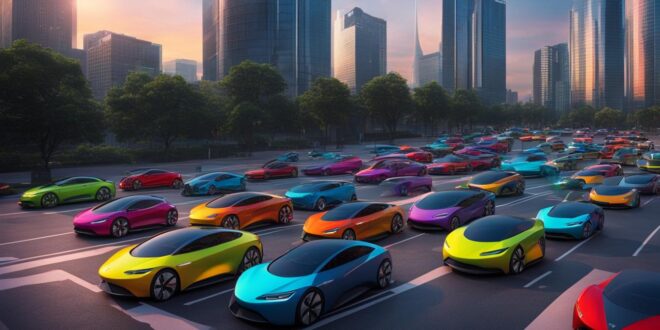The electric cars market is experiencing significant growth and is poised to shape the future of sustainable transportation. Advancements in electric vehicle technology, such as battery electric vehicle and charging infrastructure, are driving this growth. The market size of electric cars is expanding globally, and various market trends and predictions are emerging. In this article, we will explore the key trends and predictions driving the electric cars market and delve into the best electric cars currently available.
Key Takeaways:
- The electric cars market is witnessing substantial growth and is set to revolutionize the future of sustainable transportation.
- Advancements in electric vehicle technology, including battery and charging infrastructure, are driving the market’s expansion.
- The global electric car market is growing in size, and various trends and predictions are shaping its trajectory.
- Selecting the best electric cars requires considering factors such as range, performance, and charging capabilities.
- The electric cars market offers immense potential for manufacturers, investors, and businesses.
The Current State of the Electric Vehicle Market
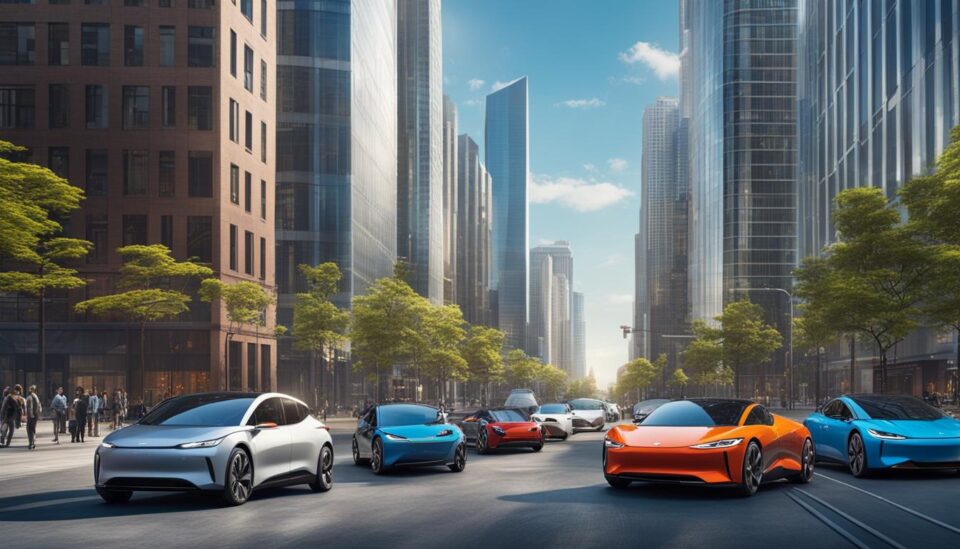
The electric vehicle market has experienced significant growth in recent years, fueled by increasing sales and an expanding market size. In 2019, the combined annual sales of battery electric vehicles (BEVs) and plug-in hybrid electric vehicles (PHEVs) surpassed two million vehicles for the first time. This surge in demand is a testament to the growing popularity of electric cars among consumers.
The market for electric vehicles is expected to continue its upward trajectory, with forecasts projecting further increases in market size and sales over the next decade. This positive outlook presents significant opportunities for manufacturers, investors, and consumers alike who are looking to capitalize on the electric vehicle market.
“The growing sales of electric vehicles reflect the increasing consumer interest in sustainable transportation and the adoption of electric vehicle technology.”
Key Players in the Electric Vehicle Market
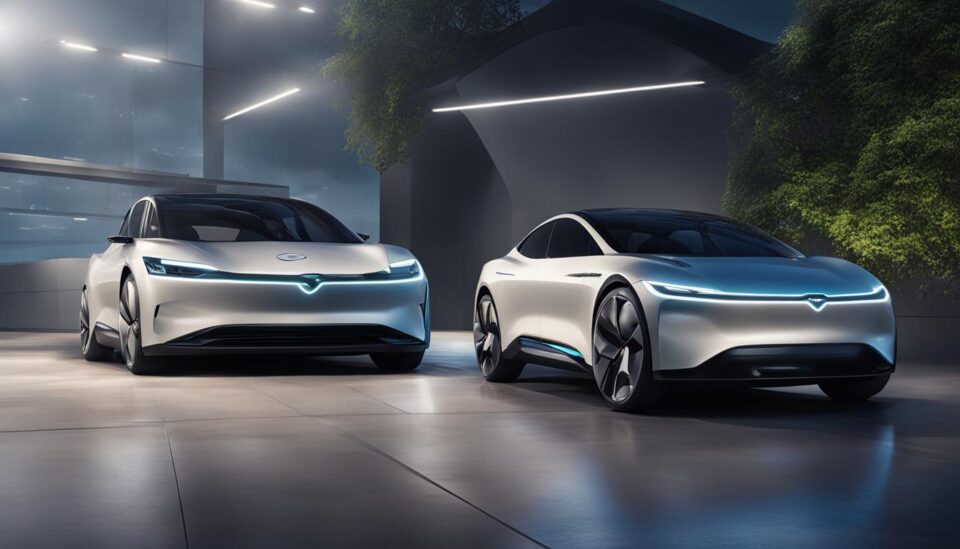
Several prominent manufacturers are leading the electric vehicle market worldwide. One of the major players in the industry is Tesla Motors, Inc., known for its innovative electric car models. Tesla has revolutionized the market with its high-performance electric vehicles and cutting-edge technology, gaining a substantial market share.
Additionally, several other notable companies are making significant contributions to the electric vehicle market. Groupe PSA, Hyundai Motors, Ford Motor Company, Zhejiang Geely Holding Group, and Toyota Group are among the key players driving technological advancements and market growth through their electric vehicle offerings.
These manufacturers are at the forefront of the electric vehicle industry, constantly pushing boundaries and introducing new electric car models with improved range, performance, and features. They play a crucial role in shaping the future of sustainable transportation and driving the global adoption of electric vehicles.
Factors Driving the Growth of the Electric Vehicle Market
There are several factors driving the growth of the electric vehicle market. One key factor is the increasing demand for electric vehicles across various applications. Electric vehicles are being adopted for industrial use, commercial use, and even home use, contributing to the overall market expansion. The versatility of electric vehicles and their ability to meet different transportation needs have fueled their demand.
Government incentives also play a crucial role in driving the growth of the electric vehicle market. Many government bodies offer incentives, such as tax credits and subsidies, to encourage consumers to switch to electric vehicles. These incentives have been instrumental in boosting the adoption of electric vehicles and expanding their market share.
Advancements in battery technology have also been a significant factor in driving the growth of the electric vehicle market. Battery technology plays a crucial role in improving the performance and range of electric vehicles. As battery technology continues to evolve, electric vehicles are becoming more practical and efficient, further stimulating market demand.
Additionally, environmental concerns have played a pivotal role in the growth of the electric vehicle market. The need for cleaner and greener transportation options has driven consumers to opt for electric vehicles. Electric vehicles produce lower emissions compared to traditional combustion engine vehicles, leading to reduced carbon footprints and improved air quality.
To sum up, the factors driving the growth of the electric vehicle market include the increasing demand for electric vehicles in various applications, government incentives, advancements in battery technology, and environmental concerns. These factors collectively contribute to the expansion of the electric vehicle market and the shift toward sustainable transportation.
“Electric vehicles are not just emerging as a trend, but are becoming a necessity in our efforts to build a sustainable future.” – [Brand Name]
Types of Electric Vehicles in the Market
The electric vehicle market offers a diverse range of vehicle types to suit various needs. Whether it’s for daily commuting, family transportation, or commercial purposes, there is an electric vehicle for every requirement.
Two-wheelers are a popular choice for short-distance commuting in urban areas. They are compact, maneuverable, and energy-efficient, making them ideal for navigating busy city streets. With advancements in electric vehicle technology, electric two-wheelers have become a practical and eco-friendly alternative to traditional gasoline-powered scooters and motorcycles.
Passenger cars are another major category in the electric vehicle market. They cater to individual and family transportation needs, providing comfort, style, and sustainability. Electric passenger cars offer comparable performance to their gasoline counterparts while reducing carbon emissions and reliance on fossil fuels. With a growing range of electric models available from various manufacturers, consumers have more options than ever before.
Commercial vehicles, such as buses and trucks, are also part of the electric vehicle market. As businesses strive for more sustainable transportation solutions, electric commercial vehicles offer significant benefits. They provide lower operating costs, reduced noise pollution, and decreased carbon footprints compared to traditional diesel-powered vehicles. The adoption of electric commercial vehicles can contribute to a greener and more sustainable transportation industry.
To summarize, the electric vehicle market encompasses various types of vehicles to meet the diverse transportation needs of individuals and businesses. From two-wheelers for short commutes to passenger cars for everyday use and commercial vehicles for sustainable business operations, electric vehicles are transforming the way we travel.
Global Electric Car Market Size and Growth

The global electric car market is experiencing rapid expansion, with continuous growth and an increasing market size. In recent years, the market for electric cars has witnessed significant growth, and this upward trend is predicted to continue. Various market forecasts indicate substantial potential for growth in the electric car market, driven by factors such as government initiatives, technological advancements, and evolving consumer preferences.
The market size of electric cars has been propelled by the growing awareness and adoption of sustainable transportation solutions. Governments around the world are implementing policies to incentivize the purchase of electric vehicles, such as tax credits and grants. Additionally, advancements in battery technology have improved the range and performance of electric cars, further driving their popularity.
The forecasted growth of the global electric car market presents numerous opportunities for both established manufacturers and up-and-coming companies in the industry. With increasing demand for electric cars, manufacturers have the opportunity to expand their product offerings and capture a larger market share. Investors are also paying close attention to the electric car market, recognizing its potential for high returns.
Lorem ipsum dolor sit amet, consectetur adipiscing elit, sed do eiusmod tempor incididunt ut labore et dolore magna aliqua. Ut enim ad minim veniam, quis nostrud exercitation ullamco laboris nisi ut aliquip ex ea commodo consequat.
Factors Driving the Growth of the Electric Car Market
- Government initiatives to incentivize electric car adoption
- Advancements in battery technology
- Increasing environmental and sustainability concerns
- Rising fuel prices and the cost-effectiveness of electric cars
- Changing consumer preferences and awareness of electric vehicle benefits
Advancements in Electric Vehicle Technology
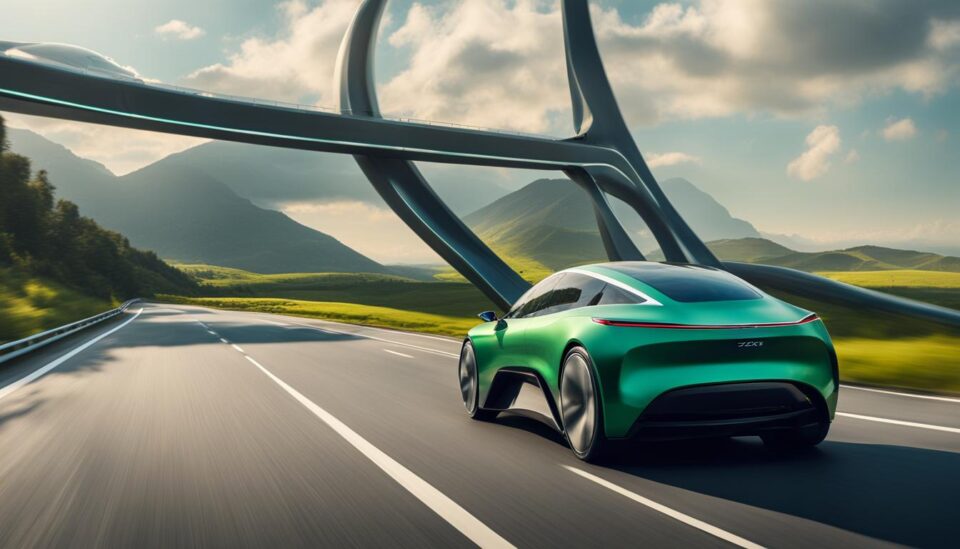
Electric vehicle technology is continuously advancing to meet the growing demand for sustainable transportation. Advancements in battery technology and charging infrastructure are key drivers of the widespread adoption of electric cars.
Battery technology plays a crucial role in the performance and range of electric vehicles. With improvements in battery technology, such as increased energy density and faster charging capabilities, electric vehicles are becoming more efficient and practical for everyday use.
As battery technology progresses, electric cars can achieve greater driving ranges, reducing range anxiety and making them a viable option for longer trips. These advancements also contribute to the overall reliability and longevity of electric vehicle batteries.
The development of efficient charging infrastructure is another critical aspect of electric vehicle technology. With an increasing number of charging stations worldwide, electric car owners can enjoy convenient and accessible charging options on their journeys.
The establishment of fast-charging networks enables drivers to recharge their vehicles quickly, providing a comparable experience to refueling a traditional gasoline-powered car. This development encourages more people to switch to electric vehicles by addressing concerns about charging time and accessibility.
By investing in electric vehicle battery technology and charging infrastructure, manufacturers and governments are supporting the growth of the electric car market and promoting a sustainable transportation future.
Electric vehicle technology is at the forefront of the transportation revolution, paving the way for a cleaner and more environmentally friendly future. With advancements in battery technology and charging infrastructure, electric cars are becoming increasingly practical, efficient, and accessible to a wider audience.
Sustainable Transportation and Electric Vehicles
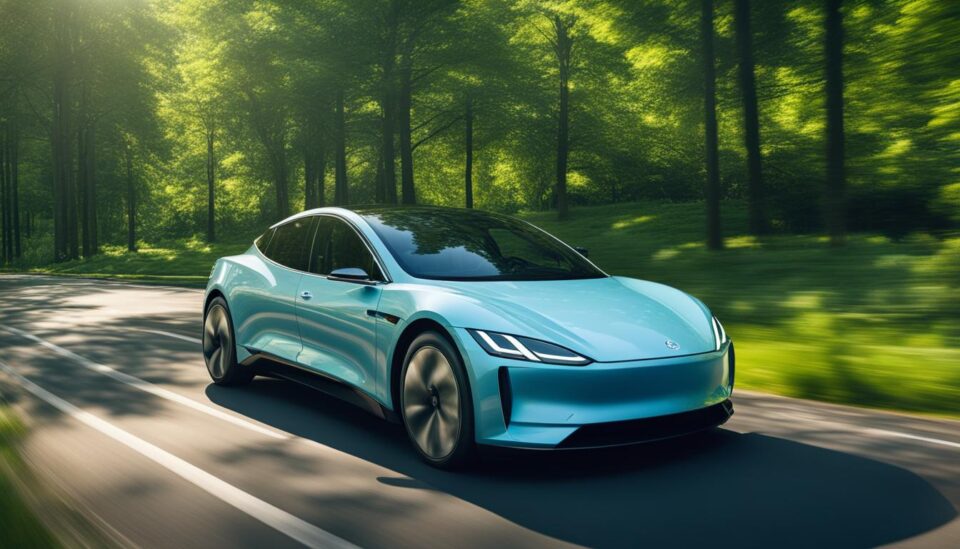
Electric vehicles are revolutionizing the concept of sustainable transportation. With their zero-emission technology, electric cars offer a cleaner and more eco-friendly alternative to traditional combustion engine vehicles. By reducing carbon emissions and air pollution, they play a crucial role in creating a greener and more sustainable transportation system.
Examples of Sustainable Transportation
The adoption of electric vehicles extends beyond individual ownership. They find applications in various sustainable transportation initiatives, transforming mobility on a larger scale. Here are a few examples of sustainable transportation:
- Public Transportation Systems: Many cities around the world are incorporating electric buses and trains into their public transportation networks. These electric-powered vehicles contribute to reducing greenhouse gas emissions and improving air quality in urban areas.
- Car-Sharing Services: Electric vehicles are becoming increasingly popular in car-sharing programs. Companies like Zipcar and Car2Go offer electric car rentals, allowing users to access eco-friendly transportation options conveniently.
- Private Commuting: Electric cars are an ideal choice for individual commuters who want to contribute to sustainable transportation. They provide a practical means of transportation while minimizing their carbon footprint.
Eco-friendly transportation options, such as electric vehicles, are crucial steps toward achieving a sustainable future. By utilizing electric cars in various transportation systems and services, we can collectively work towards reducing greenhouse gas emissions and creating a cleaner environment for future generations.
Market Opportunities and Challenges in the Electric Vehicle Industry
The electric vehicle industry presents lucrative market opportunities for manufacturers, investors, and businesses alike. The growing demand for electric vehicles opens doors for market expansion and technological advancements, driving innovation in battery technology, charging infrastructure, and sustainable transportation solutions.
However, the industry also faces significant challenges that need to be addressed for sustained growth. One of the main challenges is the high purchase costs associated with electric vehicles, which can deter potential buyers. While the cost of electric vehicles is gradually decreasing, it remains a barrier for mass adoption.
Another challenge is the limited charging infrastructure, especially in certain regions. The availability and accessibility of charging stations play a crucial role in eliminating range anxiety and ensuring a seamless charging experience for electric vehicle owners. Investing in the development of comprehensive charging networks is essential to support the widespread adoption of electric vehicles.
Furthermore, the industry faces the task of educating the public about the benefits and capabilities of electric vehicles. Overcoming misconceptions and increasing awareness about electric vehicles’ performance, range, and environmental impact is key to driving consumer confidence and fostering demand.
Addressing these challenges presents an opportunity for governments, manufacturers, and stakeholders to collaborate and create long-term strategies. By implementing policies that incentivize electric vehicle adoption, investing in charging infrastructure, and educating consumers, the industry can overcome these hurdles and capitalize on the immense potential for growth.
Ultimately, the success of the electric vehicle industry lies in its ability to maximize market opportunities and tackle challenges head-on. By continuously improving technology, lowering costs, expanding charging infrastructure, and raising awareness, the electric vehicle industry can establish itself as a sustainable and viable transportation solution for the future.
Future Predictions for the Electric Cars Market
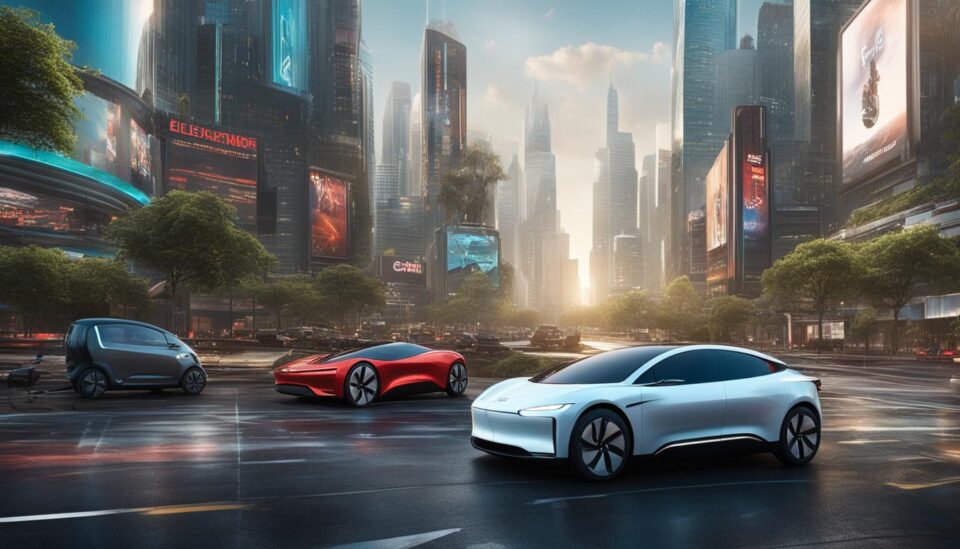
The future of the electric cars market holds immense potential and opportunities. Predictions indicate continued growth and advancements in electric vehicle technology. Market trends suggest an increased emphasis on sustainability, with a shift towards electric vehicles and the development of supportive infrastructure.
The integration of renewable energy sources and the adoption of smart grid technologies will further enhance the growth and functionality of electric cars in the future.
“The electric vehicle market is projected to witness significant growth in the coming years, driven by technological advancements and increasing consumer demand for sustainable transportation.”
As the world focuses on reducing carbon emissions and transitioning to more environmentally friendly transportation options, electric vehicles are set to play a vital role. The electric cars market predictions indicate a substantial increase in sales and market share in the years to come.
Electric Vehicle Market Trends:
-
The adoption of electric vehicles is expected to surge as governments worldwide introduce favorable policies, including tax incentives and subsidies, to encourage consumers to switch to electric cars.
-
The development of charging infrastructure will be a key trend in the electric vehicle market. Increasing investment in fast-charging networks and the expansion of public charging stations will alleviate range anxiety and make electric vehicles more appealing to a wider audience.
-
Advancements in battery technology, such as improved energy density and longer-range capabilities, will drive the growth of the electric vehicle market. As battery costs continue to decline, electric cars will become more affordable and accessible to consumers.
-
The integration of renewable energy sources, such as solar and wind power, into the electric vehicle ecosystem will promote cleaner and greener transportation. This trend aligns with the global shift towards sustainability and reduces reliance on fossil fuels.
The future of electric vehicles is promising, with innovation and sustainability at the forefront. As the electric cars market continues to evolve, it is essential for industry stakeholders to stay ahead of the trends and leverage opportunities for growth and development.
Regional Analysis of the Electric Vehicle Market

The electric vehicle market exhibits regional variations, with distinct market dynamics and trends across different parts of the world. Conducting a regional analysis of the electric vehicle market provides valuable insights into market size, growth rates, and consumer preferences. In particular, the North America electric vehicle market, Europe electric vehicle market, and Asia-Pacific electric vehicle market play significant roles in driving the global electric vehicle industry.
Each region brings its unique characteristics and opportunities to the electric vehicle market. North America, for instance, is a prominent player known for its substantial electric car sales and the presence of key electric vehicle manufacturers, including Tesla Motors, Inc. The region is witnessing a surge in electric vehicle adoption, driven by supportive government policies, improving charging infrastructure, and increasing consumer awareness and demand. The electric vehicle market in North America is projected to experience substantial growth in the coming years, with numerous market forecasts indicating a positive outlook.
Similarly, the Europe electric vehicle market showcases a favorable landscape for electric vehicle adoption. European countries have embraced sustainable transportation initiatives and implemented stringent emissions standards, fostering a conducive environment for electric vehicles. Governments in Europe offer generous incentives and subsidies to encourage electric vehicle purchases, contributing to the region’s significant market growth. Furthermore, the presence of established automotive manufacturers investing in electric vehicle technology further fuels the market’s expansion.
In the Asia-Pacific region, electric vehicles are gaining traction as governments strive to combat air pollution and reduce greenhouse gas emissions. Countries like China, Japan, and South Korea are leading the way in the electric vehicle market, with robust investments in infrastructure development, battery technology advancements, and regulatory support. The Asia-Pacific electric vehicle market’s rapid growth can be attributed to a combination of favorable government policies, increasing consumer awareness, and efforts to enhance charging infrastructure.
Impacts of COVID-19 on the Electric Vehicle Market
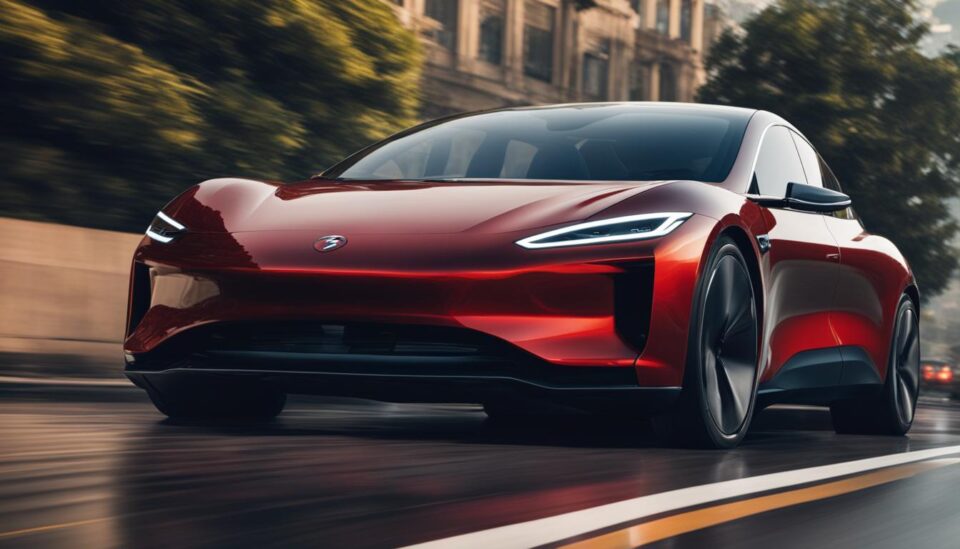
The COVID-19 pandemic has caused unprecedented disruptions across industries, and the electric vehicle market has not been immune to its impact. The global health crisis has resulted in supply chain disruptions, manufacturing delays, and a decline in consumer demand for electric vehicles.
As lockdown measures and travel restrictions were implemented worldwide, the production and distribution of electric vehicles faced significant challenges. Manufacturing operations were temporarily halted or scaled back, affecting the availability and supply of electric cars.
This disruption in the electric vehicle market was further amplified by a slowdown in consumer demand. With the uncertainty surrounding the pandemic, potential buyers were hesitant to make new purchases, causing a decline in sales. Economic uncertainties and job losses also affected consumer spending power, further impacting the market.
However, despite the temporary slowdow, the long-term prospects for the electric vehicle market remain promising. As countries gradually reopen and the world adjusts to the new normal, the market is expected to recover and continue its growth trajectory.
Governments, manufacturers, and industry stakeholders are taking proactive measures to adapt and ensure the resilience of the electric vehicle market. Governments are implementing stimulus packages and policies to support the adoption of electric vehicles, incentivizing buyers and providing subsidies for electric car purchases. Manufacturers are ramping up production and investing in research and development to enhance electric vehicle technologies and improve affordability. Industry stakeholders are collaborating to expand charging infrastructure, address range anxiety concerns, and educate consumers about the benefits of electric vehicles.
Key Impacts of COVID-19 on the Electric Vehicle Market:
- Supply chain disruptions
- Manufacturing delays and reduced production
- Decline in consumer demand
- Economic uncertainties and job losses
Despite these challenges, the electric vehicle market is expected to emerge stronger and continue its growth in the post-pandemic era. The increasing focus on sustainability, government initiatives, and advancements in electric vehicle technology provide a strong foundation for market recovery and expansion.
Conclusion
The electric cars market is a rapidly evolving industry with immense growth potential. Advancements in technology, increasing consumer demand, and sustainability goals are driving this market forward. Despite the challenges faced, such as the impact of the COVID-19 pandemic, the electric vehicle market is poised to continue expanding.
Governments and companies worldwide are making significant investments in electric vehicle infrastructure and technology, further bolstering the future of sustainable transportation. The market trends indicate a shift towards electric vehicles and the development of supportive charging infrastructure. As the integration of renewable energy sources and smart grid technologies continues, the electric cars market is set to thrive.
In summary, the electric cars market is poised for a bright future. With the ongoing advancements in technology and increasing emphasis on sustainability, electric vehicles are becoming the preferred choice for consumers. The market’s growth potential, coupled with global efforts to reduce carbon emissions, positions electric cars as a key player in the future of transportation.
FAQ
What is the current state of the electric vehicle market?
The electric vehicle market is experiencing significant growth and expanding globally, with increasing sales and market size. There are various projections indicating a continued increase in market size and sales over the next decade.
Who are the key players in the electric vehicle market?
Some of the major players in the electric vehicle market include Tesla Motors, Inc., Groupe PSA, Hyundai Motors, Ford Motor Company, Zhejiang Geely Holding Group, and Toyota Group.
What factors are driving the growth of the electric vehicle market?
The increasing demand for electric vehicles can be attributed to various factors, including government incentives, advances in battery technology, and environmental concerns. Electric vehicle applications in industries, commercial use, home use, and other areas also contribute to the market growth.
What types of electric vehicles are available in the market?
The market offers various types of electric vehicles, including two-wheelers, passenger cars, and commercial vehicles. Two-wheelers are popular for short-distance commuting, while passenger cars cater to individual and family transportation needs. Commercial vehicles, such as buses and trucks, provide sustainable transportation options for businesses.
What is the size and growth of the global electric car market?
The electric car market has witnessed significant growth in recent years, with increasing market size. Various market forecasts project continued upward growth and substantial opportunities driven by government initiatives, technological advances, and changing consumer preferences.
What are the advancements in electric vehicle technology?
Electric vehicle technology is constantly evolving, with advancements in battery technology and charging infrastructure. These advancements include increased energy density, faster charging capabilities, and the development of efficient charging infrastructure.
How are electric vehicles contributing to sustainable transportation?
Electric vehicles offer a cleaner and more sustainable alternative to traditional combustion engine vehicles. They help reduce carbon emissions and air pollution, and they are used in various sustainable transportation initiatives such as public transportation, car-sharing services, and private commuting.
What are the market opportunities and challenges in the electric vehicle industry?
The electric vehicle industry provides significant opportunities for manufacturers, investors, and businesses. However, it also faces challenges such as high purchase costs, limited charging infrastructure, and range anxiety among potential buyers.
What are the future predictions for the electric cars market?
The electric cars market is expected to continue expanding with advancements in electric vehicle technology and a growing emphasis on sustainability. Market trends suggest a shift toward electric vehicles and the development of supportive infrastructure.
How does the electric vehicle market vary regionally?
The electric vehicle market varies regionally, with different market dynamics and trends in different parts of the world. The North America, Europe, and Asia-Pacific regions are among the key regions driving the global electric vehicle industry.
What is the impact of COVID-19 on the electric vehicle market?
The COVID-19 pandemic has had a significant impact on the electric vehicle market, disrupting supply chains, manufacturing operations, and consumer demand. However, the market is expected to recover and continue its growth trajectory with the implementation of strategies to adapt to changing market conditions.
What can we conclude about the electric cars market?
The electric cars market is a rapidly evolving industry with significant growth potential, driven by advances in technology, increasing consumer demand, and sustainability goals. Despite challenges and the impact of the COVID-19 pandemic, the market is expected to continue expanding, promising a greener future of transportation.
 Sharing is Caring Blog Something different…
Sharing is Caring Blog Something different…
